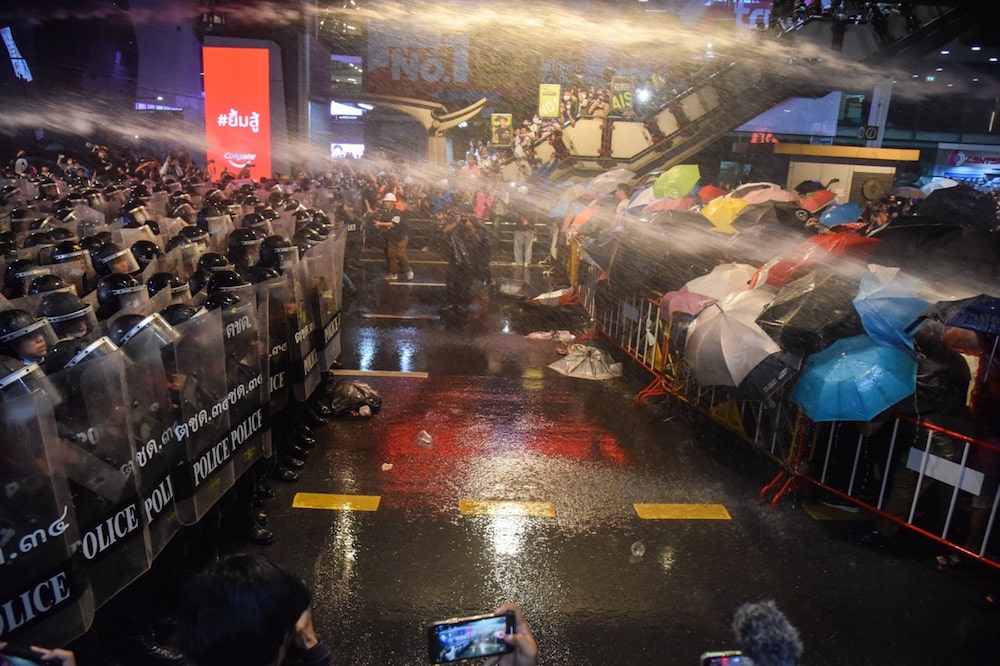In a briefing, the Thai Lawyers for Human Rights and ARTICLE 19 said Thailand authorities have arrested or charged at least 173 individuals in relation to their protest activities since the beginning of 2020.
This statement was originally published on article19.org on 25 October 2020.
The Thai government has repeatedly violated the human rights of peaceful protesters during a crackdown on a vigorous and growing youth-led protest movement, Thai Lawyers for Human Rights and ARTICLE 19 said in a briefing released today. Authorities should end baseless criminal proceedings and refrain from using force against protesters. The government should fulfil its obligations under international human rights law by creating an environment in which Thai people can safely exercise their rights to freedom of expression and peaceful assembly without fear or interference.
“The actions of the Thai authorities add weight to the demands of protesters, who are calling for democratic reforms and respect for human rights,” said Yaowalak Anuphan, Head of Thai Lawyers for Human Rights. “Many of our clients face years or decades behind bars merely because they joined peaceful protests, criticised the government, or spoke openly about the role of the monarchy in Thailand.”
The briefing, #WhatsHappeningInThailand: Government crackdown on the right to protest, describes human rights violations associated with the Thai government’s response to the 2020 youth-led protest movement. It draws from media reporting, official documents, and other publicly available information, as well as the records of Thai Lawyers for Human Rights, which is providing legal representation to many of the individuals facing charges because of their protest activities.
Since the beginning of 2020, thousands of Thai people have gathered and marched to demand the dissolution of Thailand’s military-backed government, the drafting of a new constitution, and an end to the harassment of activists and government critics. In the past three months, the movement has increasingly articulated demands for reform of the monarchy, a development without precedent in recent Thai history.
Thai authorities have deployed a wide range of tactics in an attempt to head off the protest movement.
The government has twice invoked emergency powers to restrict assemblies. In March, the government declared a state of emergency to combat the COVID-19 pandemic, issuing regulations that included a broad and vague ban on public gatherings. The government continued to arbitrarily apply this provision against pro-democracy protesters until the end of July, despite allowing other gatherings to proceed and most economic activities to return to normal. In October, the government declared a ‘severe state of emergency’ in response to large, sustained protests in Bangkok and prohibited assemblies of five or more people. The declaration, which the government justified with vague allusions to national security, was reversed after one week.
Authorities have arrested or charged at least 173 individuals in relation to their protest activities since the beginning of 2020. Many are accused of violating emergency measures, which carries a penalty of up to two years’ imprisonment, or breaching the Public Assembly Act, a law that is inconsistent with international human rights standards. However, authorities have charged others with sedition, a crime punished with up to seven years’ imprisonment. Some prominent activists and protest leaders face charges in multiple cases.
In recent weeks, the government has escalated its attacks on protesters. Riot police have dispersed peaceful protests without justification and in a manner that violates law enforcement standards on the use of force. Authorities have physically blocked access to protest sites and shut down transportation networks, violating the rights of not only protesters but also Bangkok commuters and residents. The government has also issued orders to social media companies and internet service providers in an attempt to block content critical of the government or monarchy and disrupt the channels of communication used by protesters.
The government’s response to the protest movement falls foul of Thailand’s obligations under the International Covenant on Civil and Political Rights, a human rights treaty to which it acceded in 1996. The treaty protects the rights to freedom of expression and peaceful assembly. The UN Human Rights Committee, the body responsible for monitoring implementation of the treaty, has elaborated on the responsibilities of governments in relation to protests in its General Comment No. 37, which was adopted in July. The Committee emphasised that authorities must not only refrain from violating the rights of protesters, they must also proactively create the conditions in which the right to freedom of peaceful assembly can be enjoyed. Moreover, the Committee noted that political speech and protests with a political message enjoy heightened protection under international human rights law.
“The Thai government’s actions speak louder than its words,” said Matthew Bugher, ARTICLE 19’s Head of Asia Programme. “Authorities invoke public safety as a justification for restricting protests one day and attack protesters with water cannons and riot police the next. They warn that protests will disrupt traffic and then shut down transportation networks for the entire city. It is time for Thailand’s leaders to begin listening to the protesters rather than trying to silence them.”



